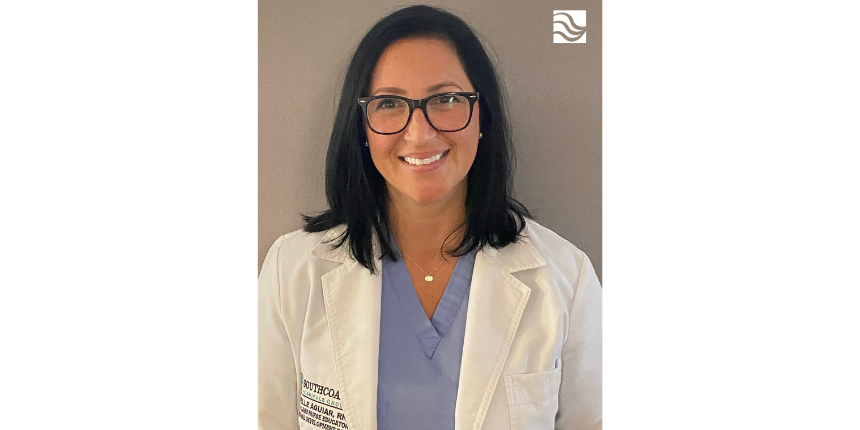Staff Profiles
Critical Care Nurse Educator Steps up to COVID-19

Stories from the Southcoast Frontlines: Critical Care Nurse Educator, Michelle Aguiar
One year ago, the World Health Organization declared the Novel Coronavirus a pandemic. Soon after, Southcoast Health saw our first patient with COVID-19.
Quickly adapting to the unknown, healthcare professionals throughout the organization put their fears aside. They showed up each day ready to learn about and battle the pandemic.
Michelle Aguiar, a #SouthcoastFrontlines hero, is a Critical Care Nurse Educator who works primarily within the Intensive Care Unit, Coronary Care Unit, and Cardiac Surgery Intensive Care Unit at Charlton Memorial. She also assists with Interventional Cardiology Services.
“We all had our fears, and fears for our community,” Michelle says today. “I was inspired by the collaboration of our clinical and non-clinical staff.”
Keeping up With Day-to-Day Safety
Michelle’s role is extensive, and it became more complex with the onset of the pandemic. In this position, Michelle works closely with a group of nurse educators, clinical expert nurses, and a director. Together, this team kept up with day-to-day safety and training, implementing changes as needed.
“This role became even more critical as we entered the pandemic and our workflows changed at the bedside,” she says.
Additionally, in her clinical role, Michelle provides frontline support in the nursing profession as a critical care expert-resource staff member to severely ill patients. Throughout the past year, her patients were mainly COVID-19-positive individuals and Patients Under Investigation (PUI). PUI show COVID-19 symptoms but are awaiting confirmed test results.
Adapting to New Models of Critical Care
With COVID-19, critical care at Charlton Memorial became vastly different. All clinical and non-clinical staff needed to know how the zones were managed. They also needed to know what precautions to take to prevent transmission of the virus. New protocols such as a buddy system for donning and doffing personal protective equipment (PPE) were instated to make sure everyone was safely monitored.
Additionally, education huddles at the beginning and during each shift became essential. More over, five new critical care beds were created with expedited development. A vital treatment that Michelle helped develop was a proning program. The program included providing simulation-based training for all Critical Care staff and proning teams. Proning a patient means safely rotating that patient in respiratory distress onto their stomachs. Placing patients in the prone position was pivotal to improving the oxygenation of COVID-19 patients.
When the Critical Care team needed extra help, team members from the procedural and surgical areas stepped up to assist. For months, those healthcare professionals put aside their fears as they entered the Critical Care Unit to help.
“It was amazing to see the multidisciplinary collaboration and support during this unprecedented time,” Michelle says. “I’ve never been so impressed by the professionalism and teamwork to help our patients survive.”
The Importance of Strong Bonds and Support
Recalling the first few months of the pandemic with a heavy heart, she reflected on how the team was able to create strong bonds. Therefore, they quickly felt like family at a time when they needed it most. Focusing primarily on the health of the staff and patients, many team members were practicing social distancing with their own families. Colleagues became who they saw the most in their personal lives and having that support system was crucial during this time.
“It’s been so hard, as we have been extremely busy, but we are not out of the pandemic yet,” Michelle says. “Sitting back and reflecting on how life changes, we work in high-stress environments day to day. We can get so caught up in that, that sometimes we forget our own self-care and emotional health.”
Recently, she took up transcendental meditation, which was offered to Southcoast Health employees during the pandemic.
Looking Ahead – Striving for a New Normal
While Michelle’s role at the hospital was her top priority this year, she was still able to finish her graduate studies, earning her MSN in August of 2020. With two sons at home, she strives to provide some normalcy during the pandemic for her family as much as possible. In this past year, everyone’s life has changed.
Looking ahead, Michelle is hopeful that the vaccines will help the community achieve some normalcy, and is thankful for every team member that she has worked with to help get through this time. She loves what she does and as a Nurse Educator hopes to provide her team with a strong culture with a spirit of inquiry and learning as they continue getting through the pandemic together.
“I’m still in awe of the adaptability of our staff, and I’m so proud to be part of the team,” she says. “Our whole organization has gone through so much, and everyone rose to the occasion.”
Thank you, Michelle!
